The AMD Threadripper 2990WX 32-Core and 2950X 16-Core Review
by Dr. Ian Cutress on August 13, 2018 9:00 AM ESTHEDT Benchmarks: Office Tests
The Office test suite is designed to focus around more industry standard tests that focus on office workflows, system meetings, some synthetics, but we also bundle compiler performance in with this section. For users that have to evaluate hardware in general, these are usually the benchmarks that most consider.
PCMark 10: Industry Standard System Profiler
Futuremark, now known as UL, has developed benchmarks that have become industry standards for around two decades. The latest complete system test suite is PCMark 10, upgrading over PCMark 8 with updated tests and more OpenCL invested into use cases such as video streaming.
PCMark splits its scores into about 14 different areas, including application startup, web, spreadsheets, photo editing, rendering, video conferencing, and physics. We post all of these numbers in our benchmark database, Bench, however the key metric for the review is the overall score.
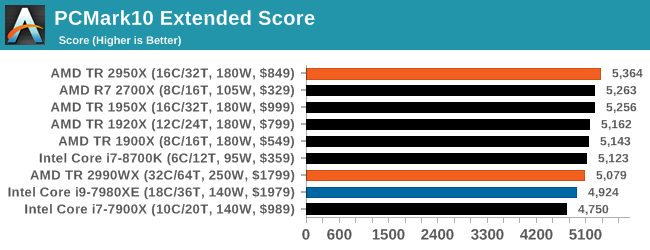
One of the downsides of PCMark is that it seems to bunch up all the results, showing them relatively close together, but interestingly here that the Intel processors sit near the bottom, with the 2950X and 2700X on the podium.
Chromium Compile: Windows VC++ Compile of Chrome 56
A large number of AnandTech readers are software engineers, looking at how the hardware they use performs. While compiling a Linux kernel is ‘standard’ for the reviewers who often compile, our test is a little more varied – we are using the windows instructions to compile Chrome, specifically a Chrome 56 build from March 2017, as that was when we built the test. Google quite handily gives instructions on how to compile with Windows, along with a 400k file download for the repo.
In our test, using Google’s instructions, we use the MSVC compiler and ninja developer tools to manage the compile. As you may expect, the benchmark is variably threaded, with a mix of DRAM requirements that benefit from faster caches. Data procured in our test is the time taken for the compile, which we convert into compiles per day.
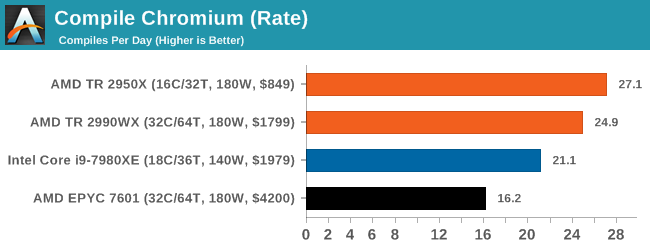
This test is such a nice mix of ST, MT, and memory limited flow that it is really interesting to see where the results end up. Unfortunately for our new suite the output files were not set up correctly, so despite running the test we only ever got a handful of results. But it shows an interesting metric: the 2950X sits ahead of the 2990WX, with both ahead of the Core i9, and the EPYC system being beaten handily due to its lower frequencies.
3DMark Physics: In-Game Physics Compute
Alongside PCMark is 3DMark, Futuremark’s (UL’s) gaming test suite. Each gaming tests consists of one or two GPU heavy scenes, along with a physics test that is indicative of when the test was written and the platform it is aimed at. The main overriding tests, in order of complexity, are Ice Storm, Cloud Gate, Sky Diver, Fire Strike, and Time Spy.
Some of the subtests offer variants, such as Ice Storm Unlimited, which is aimed at mobile platforms with an off-screen rendering, or Fire Strike Ultra which is aimed at high-end 4K systems with lots of the added features turned on. Time Spy also currently has an AVX-512 mode (which we may be using in the future).
For our tests, we report in Bench the results from every physics test, but for the sake of the review we keep it to the most demanding of each scene: Ice Storm Unlimited, Cloud Gate, Sky Diver, Fire Strike Ultra, and Time Spy.
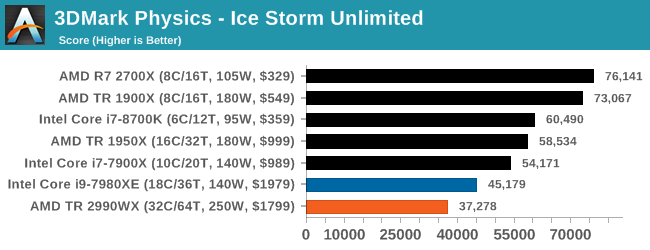
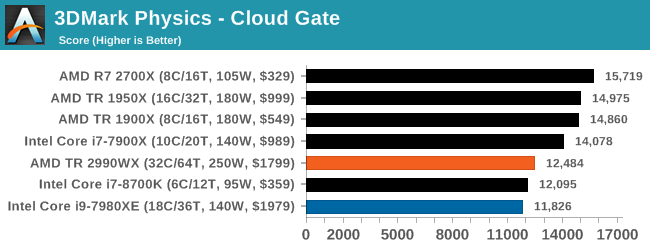
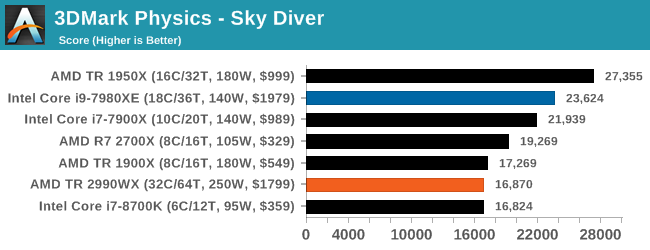
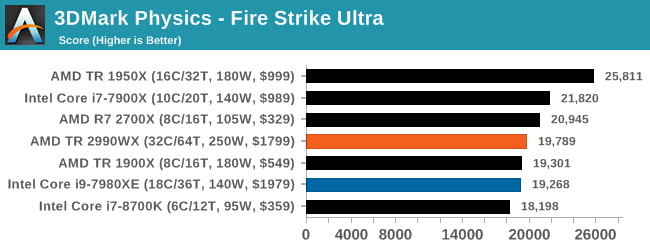
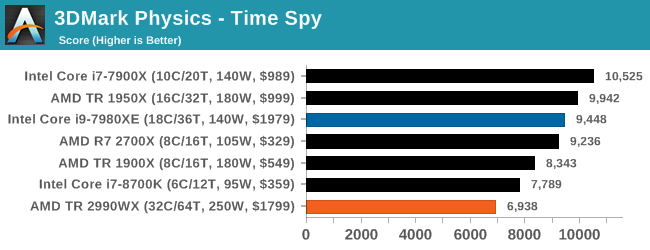
In the low end tests, it is clear that having these big processors doesn’t do much for performance, but even as we go up through Fire Strike and Time Spy, there seems to be a natural limit to the usefulness of these parts. Physics clearly loves having some extra memory bandwidth, and we know Time Spy isn’t meant to scale beyond about 10 cores, but we do see the 10 core processor sitting out front. Some of our testing sweeps had this benchmark configured incorrectly so it will be interesting to see how it fills out with some other mid and high core count processors.
GeekBench4: Synthetics
A common tool for cross-platform testing between mobile, PC, and Mac, GeekBench 4 is an ultimate exercise in synthetic testing across a range of algorithms looking for peak throughput. Tests include encryption, compression, fast fourier transform, memory operations, n-body physics, matrix operations, histogram manipulation, and HTML parsing.
I’m including this test due to popular demand, although the results do come across as overly synthetic, and a lot of users often put a lot of weight behind the test due to the fact that it is compiled across different platforms (although with different compilers).
We record the main subtest scores (Crypto, Integer, Floating Point, Memory) in our benchmark database, but for the review we post the overall single and multi-threaded results.
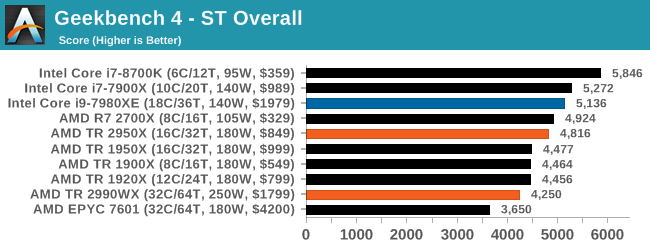
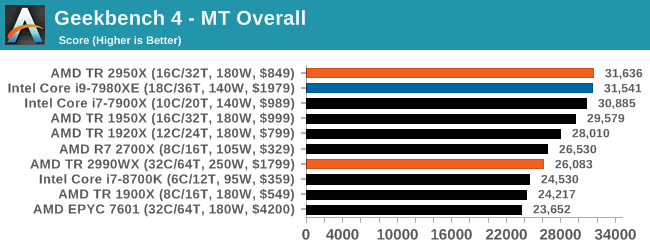










171 Comments
View All Comments
HStewart - Monday, August 13, 2018 - link
"I highly highly doubt that Intel would postpone 10nm just to “shut down AMD""Probably right - AMD is not that big of threat in the real world - just go in to BestBuy - yes they have some game machines. a very few laptops including older generations
Spunjji - Tuesday, August 14, 2018 - link
That is some impressive goalpost moving that you just did *on your own claim*.Intel's issues have nothing to do with AMD, but they will allow a resurgent AMD to become more competitive over time. Pointing to how little of a threat AMD are *right now* and/or making up weird conspiracy theories that place Intel as the only mover and shaker in the entire industry won't change that.
Relic74 - Wednesday, August 29, 2018 - link
Consumer based computers is but a small portion of the market. Servers, millions of them needed every year to fill the demand needed by, well, everyone who hosts a site, government, networking farms a mile long, etc. The server market is huge and is growing almost faster than tech companies can provide. It's why I always thought Apple getting out if the server market was kind of a stupid ideal. All of the servers they ever created were sold before they were even created. I guess the margains were to small for them, greedy bastards. Why only make double the profits when you make 5x with consumer products. Seriously, an iPhone X costs less than $200 to make now, it used to be $250 but now its $200, greedy bastards. Oh, did you know it costs Apple less than $3 to go from 64GB to 128GB, ugh.Ozymankos - Sunday, January 27, 2019 - link
it matters what you consider as costsdo you calculate the shipping costs,the marketing costs,the salaries of everyone involved,the making of new facilities?
Eastman - Tuesday, August 14, 2018 - link
Intel isn't finished. They are still king of single thread performance. We will see if Zen 2 will surpass Intel's single thread performance.seanlivingstone - Monday, August 13, 2018 - link
Do you know that Jensen Huang is Lisa Su's uncle? Intel is done.f1nalpr1m3 - Thursday, October 25, 2018 - link
Expected Results vs Actual:Stats Expected Q3 2018 Results Actual Q3 2018 Results
Revenue($B) $18.1 $19.2
EPS $1.15 $1.40
UnNameless - Tuesday, August 14, 2018 - link
Sadly this is true. AMD tries hard and in the most part succeeds. Intel frankly showed some kind of panic for the niche market of top end processors with that chilled fiasco of a 5 GHz CPU. This means AMD puts quite some pressure onto themOutlander_04 - Tuesday, August 14, 2018 - link
AMD have bounced back very quickly . Mostly because people are starting to accept how over priced intel have beenhttps://wccftech.com/intel-coffee-lake-amd-ryzen-c...
twtech - Wednesday, August 15, 2018 - link
I don't think branding issues is going to stop purchases of AMD chips when they are the best fit for a particular use-case, but the lack of direct access to memory for half of the cores in the 2990wx is going to keep it from being the knockout punch for HEDT that it could have been.Looking at these benchmark results, that has seriously gimped the performance of the 32-core TR to the point where it is slower than the 16 core in some threaded workloads.
Sure, you can just go ahead and buy the 16-core 2950x instead, but then you're reduced back to being in 7980xe territory - albeit at a cheaper price point - but the point is, it's not the clear win that a relatively high clocked 32-core CPU probably could have been without the memory access issue.